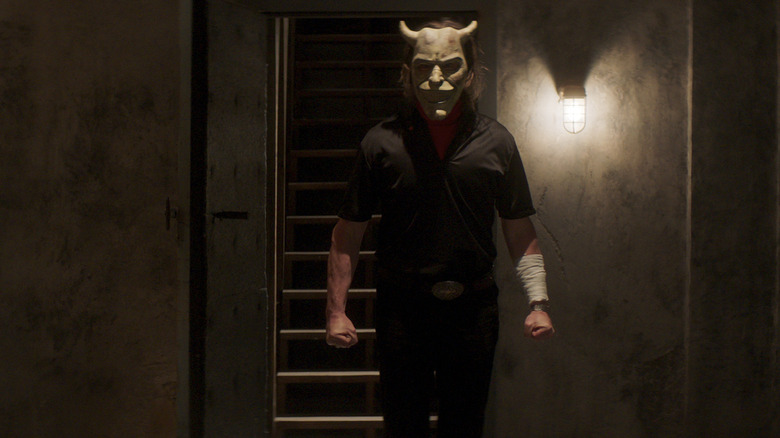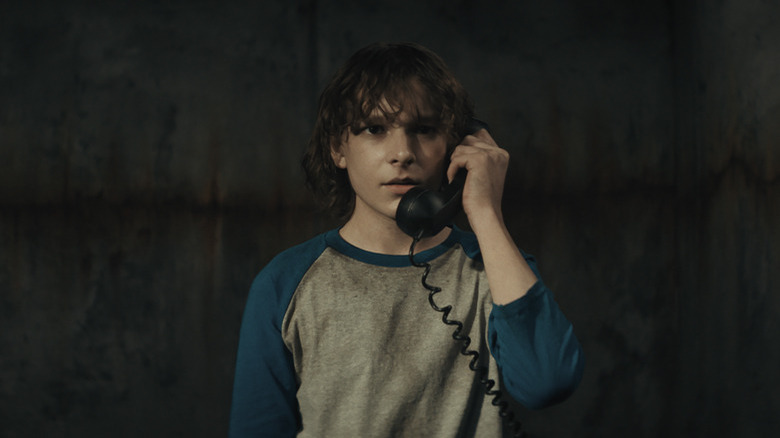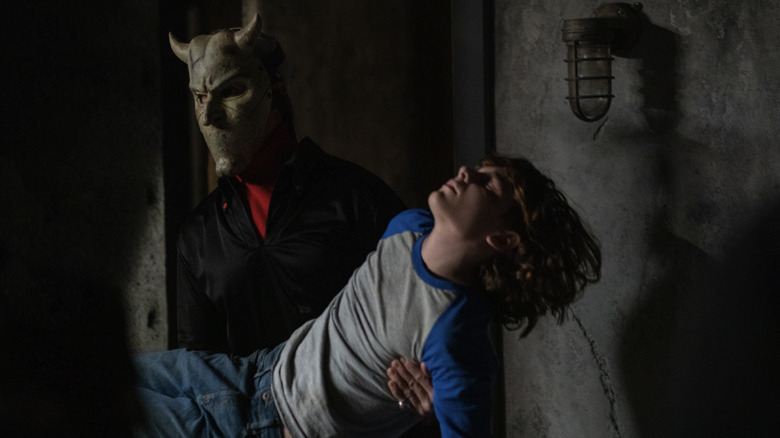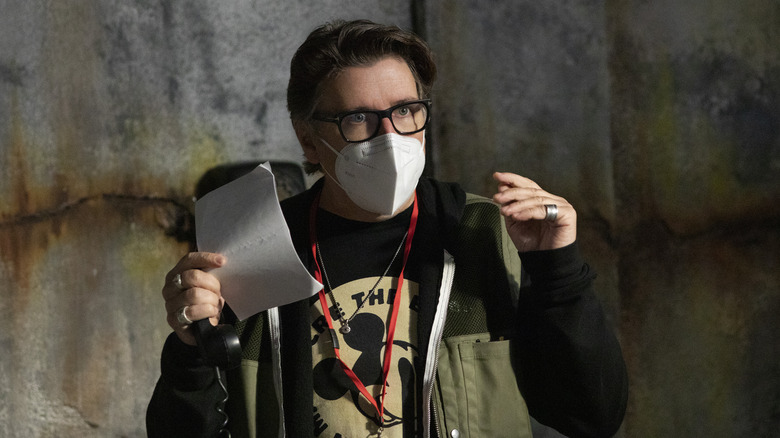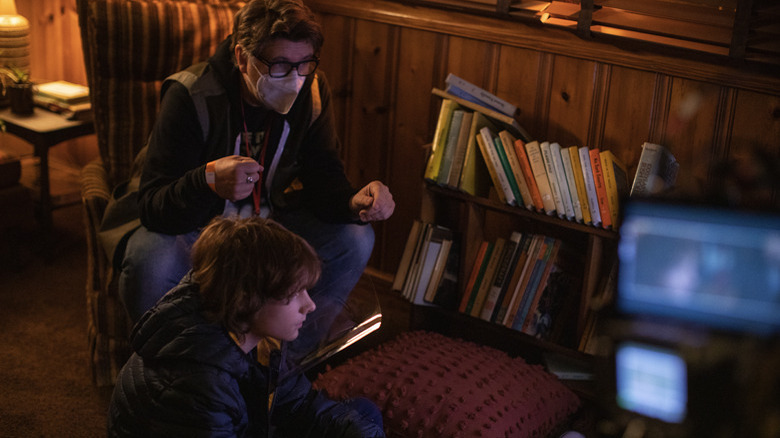The Black Phone's Scott Derrickson On The Power Of Unknowability [Spoiler Interview]
After parting ways with the folks at Marvel Studios over "Doctor Strange in the Multiverse of Madness," director Scott Derrickson returned to his horror roots with "The Black Phone," a stripped-down, low-key movie that is (not-so-secretly) as much a coming-of-age movie as a spooky horror flick. The adaptation of Joe Hill's short story is set in 1970s Denver and stars Ethan Hawke as The Grabber, a mysterious murderer who kidnaps children and holds them in a largely bare concrete basement before killing them. We don't get to know too much about The Grabber's backstory, and as Derrickson explained in a spoiler conversation, that was very much by design. For Derrickson and co-writer C. Robert Cargill, "backstories are more limiting than they are expansive," and the sense of unknowability around a villain is what helps them truly get under your skin as an audience member.
I caught up with Derrickson ahead of the movie's Digital, Blu-ray, and DVD release, and we spoke about the idea of translating fear to the big screen, whether he's scared by his own movies, the filmic inspirations for "The Black Phone," and how the reception of the movie caused him to rethink his take on a possible sequel. Spoilers for "The Black Phone" ahead.
'One of the real keys to good directing is recognizing when something doesn't work'
I know you decided to rework the scene near the end so Robin and Finney could share the screen when they're rehearsing the phone attack. Aside from that, do you remember a particular moment during the production when things weren't working the way that you'd intended and you had to rework a scene on the fly or reimagine how you were going to shoot something?
It happened mostly in the basement, because Brett [Jutkiewicz], my DP, and I had shot listed or storyboarded everything in there. But those were very human conversations that Finney's having on the phone and with The Grabber. And so there were situations sometimes when I would set up and I would look at what I was doing and what I had prepared to do, camera-wise, and just ... I think one of the real keys to good directing is recognizing when something doesn't work. So I did a lot of readjustments and sort of improvisational shifts — or at least minor adjustments, if not major adjustments — in the basement. I think outside of there, everything is pretty close to exactly how it was prepared to be shot.
In this era of true crime obsession in which documentaries so frequently go into the mindset and methodology of killers, can you tell me a little about your decision to maintain Finney's perspective in your movie?
I'm obsessed with true crime documentaries. You can't name one that I haven't seen. I've seen everything. It's mostly what I watch. And every month, I look up all the new ones and I watch any of them that are interesting and some of them that aren't. But I think that in this case, telling it from Finney's perspective, I think the true crime passion had an influence on it, which is you want to be with that normal, innocent person, gazing at the danger and mystery of this sociopathic, pedophile, killer. It's the otherness of that character, the unknowability. You can't even see his face. What's under the mask? These are the things that make these kind of predators and monsters so fascinating to us, is that otherness. And the only way to capture that was to always be sort of experiencing The Grabber from Finney's point of view.
'You can infer all kinds of things'
Along those same lines, how did you decide how much or how little to show about The Grabber as a character?
The question that's asked a lot, and it was a question that we really asked ourselves during the writing process, was, how much of backstory did we want? And we decided to drop a few hints in there, things that you could infer, things about his ... he grew up in that house. He was a kid when that phone was there, and he heard it ring when he was a kid. You can infer all kinds of things. Was there abuse in the basement that he was involved with? Possibly.
But I really feel strongly that with these kind of iconic villains, backstories are more limiting than they are expansive. If I knew which, if any, of Heath Ledger's Joker's stories about his scars was true, I would suddenly find the character smaller. If I was given a backstory about why Hannibal Lecter eats people, I would be less interested. So I think you have to ... again, it's that mystery and that unknowability, and that otherness that makes these kind of horrific monsters scary.
'I'm trying to scare myself'
Here's a strange question: How do you translate a sense of fear, which is a nebulous, mysterious emotion, into a movie when filmmaking by nature is extremely controlled and formalized? On paper, it almost seems like those two things are sort of at odds with each other.
I think that fundamentally, it's about what you withhold. It's about withholding what you create an expectation for. You create an expectation for something very dangerous, something very potentially deadly, and you shroud it in mystery, you enshroud it in the unknowable. Is the killer in the house? I don't know. What's the face behind The Grabber's mask? I don't know. What's making the sound in "Paranormal Activity?" I don't know. And then milking that, intensifying that, intensifying both its presence and its unknowability at the same time. That's what inspires fear. What we fear is always the same thing: What we fear is the unknown. And being forced and having your characters be forced into closer and closer interactions and into greater jeopardy with the unknown is how the genre works.
For stories that you're involved with directing, you know every aspect of the filmmaking process and how all of that comes together. Is it possible for you to be scared — or "unnerved" is maybe a better word — by the final product of something you've made?
Oh, if I don't feel that, then I've failed. And I think different directors work differently this way. I mean, first of all, I'm a good horror movie audience member. I get scared in horror movies. I'm a sucker for a good jump scare. I get scared at effective horror storytelling. Oh my God, when I saw "The Witch," I left the theater and couldn't shake the terrified feeling for three days. I felt like I had contaminated myself with evil by seeing that movie.
I felt that way after seeing "Kill List" for the first time.
Yeah. It's that same kind of effect. A lot of horror directors, I think, listening to them, love being a puppet master and love manipulating an audience. And I never feel that way. I'm trying to scare myself. I'm trying to dive into material and explore things that I find genuinely frightening. And so if the movie doesn't feel scary to me, it's not going to feel scary to the audience. That's kind of my MO.
'I think that's still del Toro's greatest film'
Were there any movies that you were looking at as visual touchstones for inspiration for any elements that you were trying to get across with "The Black Phone?"
Guillermo del Toro's "The Devil's Backbone" had a big influence on this and on "Sinister." He did something really bold with that movie, which was not only just having a cast of kids in a serious horror movie that wasn't "Goonies" or something like that, but a real scary ghost story. But then he also had the audacity to just put that ghost kid just right there, front and center. There he is, he's standing there in the room with him. And so I think that movie ... personally, I think that's still del Toro's greatest film. I really love that movie, and that movie had a big influence, for sure.
"The 400 Blows," the François Truffaut movie, had an influence in terms of a raw child performance, capturing the trauma of childhood. That was certainly an influence. I think those are probably the two big ones that come to mind right now.
I know Joe Hill mentioned that he had pitched you an idea for a sequel if this movie performed well, and I think it's safe to say at this point that "The Black Phone" performed well. So, can you give me any hint about what your take for a possible sequel might be?
Well, because of the reception of the movie, that particular take isn't the one that I would want to pursue. Joe agrees. There was something about the reaction to the movie that was much bigger, broader. The emotional power of the movie was really pretty extreme. And so I've got a different take on it, which I've been talking to Joe about, which he also really likes. It's kind of half-baked right now, but there's no guarantee about it. This is just something that I'm noodling on. I would like there to be a sequel, but at this point, there's no guarantee.
Would it follow Finney?
I'm not going to say anything about it.
Fair enough. I had to try, but thank you very much, Scott, for your time, and congrats on the movie.
My pleasure. Thanks so much.
"The Black Phone" is currently available to own on Digital. It arrives on Blu-ray and DVD on August 16, 2022.
